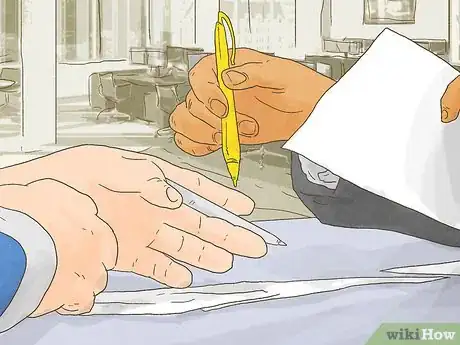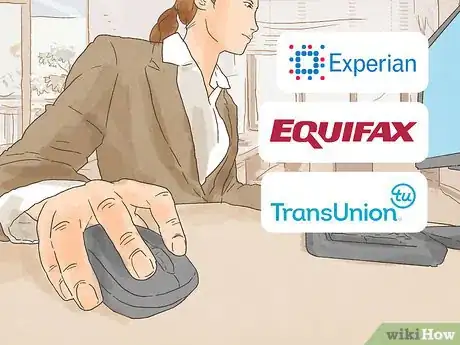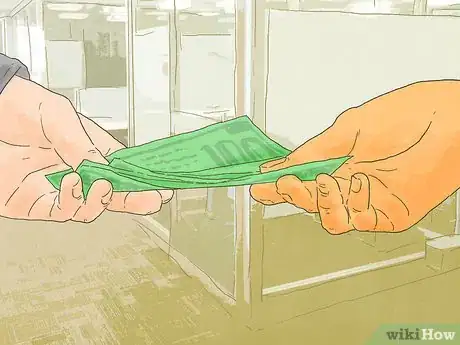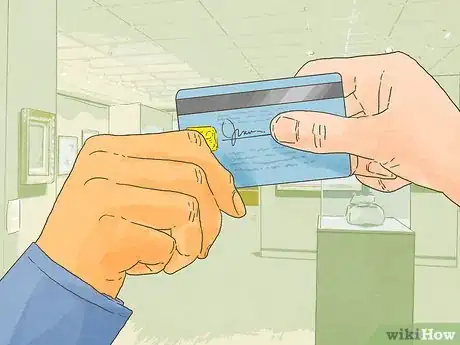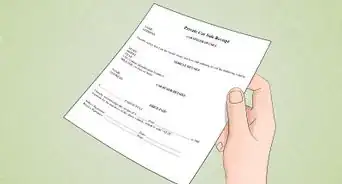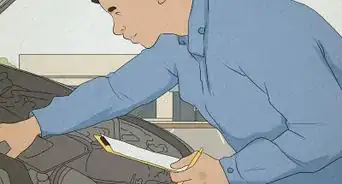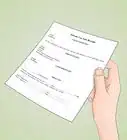This article was co-authored by Bryan Hamby. Bryan Hamby is the owner of Auto Broker Club, a trusted auto brokerage in Los Angeles, California. He founded Auto Broker Club in 2014 out of a passion for cars and a unique talent for customizing the car dealership process to be on the buyer’s side. With 1,400+ deals closed, and a 90% customer retention rate, Bryan’s focus is to simplify the car buying experience through transparency, fair pricing, and world class customer service.
There are 9 references cited in this article, which can be found at the bottom of the page.
wikiHow marks an article as reader-approved once it receives enough positive feedback. This article has 14 testimonials from our readers, earning it our reader-approved status.
This article has been viewed 637,664 times.
No matter how it happened, you may find yourself dealing with a low credit score. A low credit score can make it difficult to purchase a car. By working to optimize your credit and improve your overall standing, you can put yourself in a better position to purchase a car with no money down. Furthermore, by exploring a variety of financing options, you can improve your chances of getting the car loan you seek.
Steps
Exploring Financing Options
-
1Try to get a loan through your credit union. If you already have an account at a credit union, it is a good idea to inquire there about loans first.[1] Credit unions are generally more lenient with their qualification requirements than other banks, especially in regards to their members. If you are not a credit union member, join a credit union and ask about auto financing for problematic credit.[2]
- In order to open a credit union account, you will need a government issued I.D. and a minimum deposit. This amount will vary by credit union, but may be as low as $25.
- Once your account is open, speak to a loan representative about auto financing options.
- They will likely be able to tell you that same day whether or not you are approved and for what amount.
- Bring your loan approval letter to the car dealership, who will deal directly with the credit union.
-
2Seek out a loan through a dealership. Find an auto dealership that specializes in used cars and bad credit financing. These are often referred to as "buy here pay here" lots. This type of dealership may approve a car loan for you with little to no money down, but be prepared to pay a high interest rate.
- Many of these dealerships can approve you over the phone. They can also sit down with you in person.
- You will need to verify your identity by providing a social security number, birth date, and other information (such as previous addresses).
- It is a good idea to call and see if you are approved before you begin shopping for cars.
Advertisement -
3Explore loan options through “sub-prime lenders.” “Sub-prime lenders” specialize in loaning money to those with damaged credit. An Internet search will return numerous sub-prime lenders, and you can often fill out an application online and have an answer within minutes. Once again, be prepared to pay a high interest rate.[3]
- You will need to provide identifying information such as your social security number, birth date, and previous addresses.
- You should be able to apply for a loan and be approved within 20 minutes.
- Bring your loan approval letter to the car dealership, who will deal directly with the sub-prime lender.
- Your interest rate will vary depending on the lender and your credit score, but there are usury laws at the state level that stop lenders from being predatory.[4]
-
4Get a cosigner.[5] If you are not approved for the car loan on your own, another option is to get a family member or friend to co-sign. This means that the lender (the credit union, dealership, or other lender) will consider that person’s credit score alongside your own. This can be a good way to get a loan, and as you make payments, improve your credit score.
- This can be done through almost any lender (credit union, dealership, or sub-prime).
- If you are not approved for a loan through any or all of these channels, speak to them about getting a co-signer.
- You will then need to discuss this with your family member or friend.
- You co-signer will either need to appear in person to sign the paperwork, or submit identifying information online and signatures.
-
5Research auto loan rates. Knowing the most common loan rates will help you avoid getting blindsided by someone wanting to charge you an interest rate that is too high. Do some basic internet searches to determine the going interest rates for different types of auto loans, and use this information to bargain with your lender.[6]
- These rates vary by location and change regularly.
- Perform an online search for "average car loan rates in [your zipcode]."
- Typically, loans spread over a longer period of time may have lower interest rates. However, as you will paying the loan back for longer, the interest will add up over time.
-
6Shop for your loan before you shop for a car. Before you begin to look at cars, work on getting approved for a loan. Once you know the amount you have been approved for, shop for cars that fit this budget.[7] You don’t want to fall in love with a car on the lot only to find out you can’t afford it.[8]
Improving Your Overall Standing
-
1Remain at the same address for at least one year. Even lenders specializing in bad credit lending want to see that their clients are reliable. One way to demonstrate this is to reside at the same residence for one year or longer. If your credit report shows an endless string of addresses, this does not bode well for your reliability.[9]
-
2Maintain steady employment. Having steady employment and an income that can be verified is a crucial component to receiving a car loan. For some dealerships and sub-prime lenders, having a steady, verifiable source of income is the only factor that decides whether or not you will get a loan. If you are not employed, work to rectify this before seeking a car loan.[10]
- Your verified employment can be shown through a paycheck stub, W-2, or 1099.
- Know the address and phone number of your employer, as well as the name of someone a lender can call to verify your employment.
-
3Open a bank account. Yet another way to show that are an established and responsible adult is to maintain a bank account. You may be asked to provide information about your bank account to potential lenders, either to show your balance in savings, or to provide a location for loan money to be deposited. Not only does the absence of a bank account make you look bad, it may disqualify you for a loan.[11]
- Visit a local bank and speak to a representative about checking and/or savings accounts.
- The minimum deposit to open an account will vary by bank and type of account. In some instances, it may be as low as $20.
-
4Obtain a phone in your name. When you apply for a loan, your lender may need to contact you. This will only be possible if you have a phone. Not having a phone makes it difficult for them to communicate to you, but furthermore makes you look irresponsible. Visit a telephone provider in your area and discuss phones plans (including prepaid options) that fit your budget.
Optimizing Your Credit
-
1Learn your credit score. Go online and request credit reports from each of the three credit bureaus (TransUnion, Equifax and Experian). Learning your credit score and seeing what positive and negative items are listed on your credit report will help you to see where you stand.
-
2Evaluate your credit score. If you have a credit score of 680 or higher, you will most likely get the best interest rate loans available. Scores between 550 and 680 are considered sub-prime. If you have a sub-prime score, you may pay higher interest rates. If you have a credit score of 550 and below, it may be difficult to obtain a car loan. If your score is below 550, you may want to work on improving this score before trying to purchase a car.[12]
-
3Dispute inaccuracies. Double-check your credit report for accuracy. It is not unusual for these agencies to make mistakes. Sometimes improving your credit is as painless as disputing inaccuracies on your credit report.
-
4Pay off small balances. If there are any small, unpaid balances on your credit report, pay these off. Paying off small amounts so that they are no longer listed as “unpaid” on your credit report can work to improve your credit rating, and display good faith to potential car lenders.[13]
- Often, collection agencies will take a smaller settlement than what is owed, so try to negotiate.
-
5Optimize your "debt utilization." About 30% of your credit score is determined by your "debt utilization," that is, how much of your available credit has been used. For example, if you have a credit card with a $15,000 limit, and you have only used $3000 of it, this will help your credit score. You can optimize your debt utilization by either paying down some of your balances, or increasing your credit limits.[14]
- If you have recently gotten a raise or paid off some debts, you may by eligible for an increase in your credit limits. Contact your credit card company for details.
-
6Obtain at least one major credit card. Being approved for a major credit card (like a Visa or Mastercard) can help your credit score improve. This may be difficult if you have bad credit, but you can work toward it by opening a less prestigious credit account and making all your payments on time. After a while, you can apply for that Visa or Mastercard again.[15]
Expert Q&A
Did you know you can get expert answers for this article?
Unlock expert answers by supporting wikiHow
-
QuestionWhat credit score do you need to get a car loan?
 Bryan HambyBryan Hamby is the owner of Auto Broker Club, a trusted auto brokerage in Los Angeles, California. He founded Auto Broker Club in 2014 out of a passion for cars and a unique talent for customizing the car dealership process to be on the buyer’s side. With 1,400+ deals closed, and a 90% customer retention rate, Bryan’s focus is to simplify the car buying experience through transparency, fair pricing, and world class customer service.
Bryan HambyBryan Hamby is the owner of Auto Broker Club, a trusted auto brokerage in Los Angeles, California. He founded Auto Broker Club in 2014 out of a passion for cars and a unique talent for customizing the car dealership process to be on the buyer’s side. With 1,400+ deals closed, and a 90% customer retention rate, Bryan’s focus is to simplify the car buying experience through transparency, fair pricing, and world class customer service.
Car Buying Expert
-
QuestionHow do I buy a car when I am going through bankruptcy?
 Community AnswerThere are dealerships where you can purchase a vehicle by paying weekly. They usually will sell you a car as long as you are working and have been employed for at least a year. Keep in mind that the interest rate will be considerably higher than at a regular dealership.
Community AnswerThere are dealerships where you can purchase a vehicle by paying weekly. They usually will sell you a car as long as you are working and have been employed for at least a year. Keep in mind that the interest rate will be considerably higher than at a regular dealership. -
QuestionHow can I buy a car with no money down, poor credit and on a fixed income SSA?
 Community AnswerAny dealer who will sell you a car in your situation is probably a predatory lender who'll set up unrealistic payments you can't manage. Remember, you also need to pay insurance and possibly a registration fee, depending on where you live. Your best option is to save what you can and do your research until you can afford to buy a cheap dependable used car.
Community AnswerAny dealer who will sell you a car in your situation is probably a predatory lender who'll set up unrealistic payments you can't manage. Remember, you also need to pay insurance and possibly a registration fee, depending on where you live. Your best option is to save what you can and do your research until you can afford to buy a cheap dependable used car.
Warnings
- Do not allow yourself to be talked into signing an auto loan with a payment plan you cannot afford.⧼thumbs_response⧽
- Do not keep applying for credit because this will lower your credit score.⧼thumbs_response⧽
- Avoid financing extended warranties with high-interest loans.⧼thumbs_response⧽
References
- ↑ Bryan Hamby. Car Buying Expert. Expert Interview. 11 June 2019.
- ↑ http://www.bankrate.com/finance/auto/10-steps-to-your-best-deal-on-a-car-loan-1.aspx
- ↑ http://www.thesimpledollar.com/best-bad-credit-auto-loans/
- ↑ Bryan Hamby. Car Buying Expert. Expert Interview. 11 June 2019.
- ↑ Bryan Hamby. Car Buying Expert. Expert Interview. 11 June 2019.
- ↑ http://www.bankrate.com/finance/auto/10-steps-to-your-best-deal-on-a-car-loan-1.aspx
- ↑ Bryan Hamby. Car Buying Expert. Expert Interview. 11 June 2019.
- ↑ http://www.bankrate.com/finance/auto/10-steps-to-your-best-deal-on-a-car-loan-1.aspx
- ↑ http://moneyfacts.co.uk/guides/debt/9-steps-to-score-on-your-credit-rating/
- ↑ http://moneyfacts.co.uk/guides/debt/9-steps-to-score-on-your-credit-rating/
- ↑ http://moneyfacts.co.uk/guides/debt/9-steps-to-score-on-your-credit-rating/
- ↑ https://www.nerdwallet.com/blog/finance/credit-score-ranges-and-how-to-improve/
- ↑ http://www.bankrate.com/finance/debt/7-simple-ways-improve-credit-score-1.aspx
- ↑ http://www.huffingtonpost.com/commonbond/5-ways-to-improve-your-credit-score-in-2015_b_6470660.html
- ↑ http://bettercreditblog.org/5-amazingly-simple-techniques-to-optimize-your-credit-score/
About This Article
It can be really hard to buy a car if you don’t have any money to put down and you have bad credit. However, you may be able to get a loan through a local credit union, especially if you’re already a member of one. Also, you may be able to get financed through a dealership, especially one that advertises that it works with people with bad credit. Try to find a time that a nearby dealership is running a special offering low- or no-money-down sales. However, keep in mind that your interest rate through a dealership will probably be high, especially with a low credit score. For tips on how to improve your credit score, read on!




